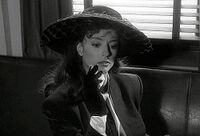Gylida
| Gylida | |
|---|---|
| Directed by | Tede Razeş |
| Starring | Leonora Weeks |
| Distributed by | National Cooperative Confederation |
Release date | 1 September 1982 |
Running time | 45 minutes |
| Country | Gylias |
| Language | English |
| Budget | Ŧ100.000 |
| Box office | Ŧ700.000 |
Gylida is a 1982 Gylian film, directed by Tede Razeş and starring Leonora Weeks. It is a cozy mystery in which private investigator Jackie Forest investigates a mysterious death that turns out to be faked.
Upon release, Gylida received critical acclaim, and became a sleeper hit. It earned an enduring cult following and was influential on Gylian cinema, being credited with kickstarting the subgenre of mounoir.
Plot

Jackie Forrest is a private investigator in Ryðai. While returning from a National Bank building with a withdrawal from her public dividend, she witnesses somebody committing suicide by jumping off a building. She calls the police and then goes to the site, but can't find the body. By the time the police and ambulance arrive, the body suddenly appears. Suspicious, Jackie tells the police what she witnessed, and asks to be notified of developments.
The autopsy yields bizarre results, showing the person died of a heart attack instead of the fall off the building. Jackie hears of the police's investigation, and asks to assist. She meets with the deceased's relatives and close friends, who are surprised at the suicide and claim there was no history of heart conditions.
Jackie continues her investigations, and a lucky break leads her to conclude that this is a case of faked death. The person in question stole a corpse to pass it off as themselves, and had plastic surgery to change their appearance. She helps police track down the culprit, who is arrested and found guilty of corpse theft and fraud. Jackie celebrates the conclusion of the case by going home to drink and watch Gilda on video.
Cast
- Leonora Weeks as Jackie Forest
Other crew members, acquaintances, and friends appear through over-the-shoulder shots and trick photography.
Production
Tede Razeş became interested in film noir while attending film school. He watched several old Acrean and Delkoran films noir, and found them "interesting visually but completely alien in terms of worldview." He worked on a noir-influenced short film for one of his classes, and the reception encouraged him to expand it into a feature film.
Tede had become acquainted with model and actress Leonora Weeks while in film school, and cast her in the role of Jackie Forrest. The film was intended to have a full cast, but the other actors withdrew for various reasons, and by the time filming was due to start, only Leonora was available. Instead of delaying production to complete the cast, Tede decided to begin filming. He commented, "La Jetée was made with even less. We have a camera, at least."
The film was made with no budget — only Ŧ100.000 was spent purchasing a camera and lighting equipment. The entire crew consisted of four people: Tede, Leonora, a cinematographer, and a make-up artist. Leonora's wardrobe came from second-hand shops and free shops. The title is a pun on Gilda, one of Reda Kazan's biggest wartime hits; it came from Tede mispronouncing it as "Glida" while in a video store. The allusion is made explicit at the end when Jackie is shown watching it on video.
Gylida was shot in black and white, and much of the crew's ingenuity was focused on concealing the lack of cast and budget. The entire film is shown from Jackie Forest's perspective, with an internal monologue and narration that parody hardboiled fiction while evoking the mischievous asides of Carla Miló and Sima Daián. Over-the-shoulder shots and trick photography are among the techniques used to give the illusion of a larger cast; Jackie internally narrating others' dialogue while they're talking to her becomes a running gag.
Several scenes were filmed on location, including the opening scene of Jackie returning from the bank. Leonora described the scenes of Jackie talking on the phone as her favourite to film, since they showed her comedic skills best.
Most of the film's sound was dubbed in post-production. Instead of a soundtrack, Tede borrowed a Mellotron and Optigan from a musician friend, and improvised with their accompaniment tapes. The Mellotron was also used for sound effects.
Reception
Gylida premiered on 1 September 1982. It was initially a low-key release, but it received positive reviews in the few media outlets that covered it, with praise for Leonora's acting, the playfully self-referential humour, and the film's stylish look.
The film gained a good reputation through word of mouth and positive reviews, and gradually built up a cult following, particularly among film students. It was a moderate success at the box office.
Legacy
Gylida is regarded as a highly influential film in Gylian cinema and is credited with kickstarting the subgenre of mounoir, whose films "share Gylida's DNA of film noir visuals, film school sensibilities, comfy atmosphere, and contempt for the right-wing paranoia of traditional noir and hardboiled fiction", according to Radix.